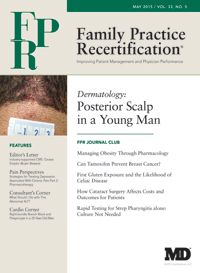Publication
Article
Family Practice Recertification
Rapid Testing for Strep Pharyngitis alone; Culture Not Needed
Author(s):
This was a systematic review and meta-analysis examining the accuracy of rapid antigen diagnostic tests (RADTs) for group A strep (GAS) pharyngitis in children and adults as well as differences between studies already performed.
Review
Rapid Diagnostic Tests for Group A Streptococcal Pharyngitis: A Meta-analysis. Lean WL, Arnup S, MPhil, Danchin M, Steer A. Pediatrics 2014; 134(4): 771-781
Study Methods
This was a systematic review and meta-analysis examining the accuracy of rapid antigen diagnostic tests (RADTs) for group A strep (GAS) pharyngitis in children and adults as well as differences between studies already performed.
Data was collected via Medline and Embase via OvidSP using articles published between 1996 and 2013. 40 articles were included involving analysis of 48 studies covering a total of 23,934 patients. Studies included used GAS culture as a reference standard. This meta-analysis also looked at a sub-category of children, included in over 25 studies.
Authors analyzed data regarding type of test, number of positive tests, sensitivity and specificity, with independent calculations performed by the authors regarding sensitivity/specificity if this data was not available. Types of RADTs were separated into categories and included in one category immunocromatographic assay and lateral flow assay, in a second category DNA probe, PCR and FISH, and in four other separate categories latex agglutination, liposomal technology, ELISA and OIA.
Results
The summary estimate of sensitivity of RADTs across all studies analyzed was found to be 0.86 (95% CI 0.83 to 0.88), and the summary estimate of specificity was found to be 0.96 (95% CI 0.94 to 0.97). Specificity was found to be higher than sensitivity across all RADT categories with the molecular technique category (DNA probe, PCR and FISH) performing best. In the children sub-category, sensitivity was estimated at 0.87 (95%CI 0.84-0.89) and specificity at 0.96 (95% CI 0.95 to 0.97). Molecular techniques performed best in this sub-population as well.
Wide variation was noted in sensitivity with relatively less variability in specificity across studies. Variability was noted to be highest in the lateral-flow/immunochromatographic assay category.
Conclusion
RADTs in the diagnosis of GAS pharyngitis have high accuracy in both adult and pediatric populations, with tests using molecular techniques (PCR, DNA probe, FISH) performing best. RADTs have a high enough sensitivity to allow for not using back up culture with negative results, however this final decision should remain in the hands of the performing physician.
Discussion
Group A Strep pharyngitis affects millions of people overall each year in the US and accounts for $224-539 million healthcare dollars a year spent amongst school-aged children alone (1). It is the cause of 15-30% of all cases of pharyngitis in children between 5 and 15(2) and 5-15% in adults (3). There is no well-defined clinical presentation that can accurately reveal GAS pharyngitis. Centor criteria (see below) can aid in avoiding unnecessary testing and help point toward a more likely case of GAS pharyngitis especially if all four criteria are present (4).
Given the rare but dangerous sequelae including rheumatic fever, retropharyngeal abscess, and glomerulonephritis, it is important to appropriately test for and treat pharyngitis when present. It is also important, however, to avoid inappropriate antibiotic prescription when GAS is not the cause of pharyngitis. Current guidelines in the US recommend use of a rapid antigen diagnostic test for diagnosis, with backup throat culture for negative tests recommended in children and adolescents but not adults (5).
This meta-analysis further supports the use of RADTs which are extremely specific and relatively sensitive, and also highlights the high variability in sensitivity amongst these tests. The article further provides some insight into molecular techniques as the most promising category of RADT in terms of accuracy.
The authors remark on the varied settings present in many of the studies analyzed, from the emergency department to the outpatient clinic and from testing before to after antibiotic administration, which may affect test sensitivity and specificity as well. While the molecular technique RADTs now in use are hailed as the most accurate tests, many of the tests in this category take a few hours to result compared with the commonly used immunoassay RADTs that take less than 30 minutes (6). This longer turnaround time can be a hindrance to timely care in an outpatient setting.
This review supports the current guidelines for adults since strep pharyngitis is much less common in this population. For children, GAS pharyngitis is more common and, though very rare (especially in the US), sequelae of this infection does have significant morbidity.
The review supports the current recommendations of using Centor scoring and appropriate use of RADTs, and further delineates the lack of clinical benefit from throat culture when RADT is negative.
Centor Scoring:
Tonsillar Exudates
+1 point
Tender anterior cervical lymphadenopathy
+1 point
Fever by history
+1 point
Age 3-15 years
+1 point
Age 15-45 years
0 points
Age >45
-1 point
cough
-1 point
Score
0 or 1 = Not GABHS, antibiotics not needed,
2-3: test with RADTs and treat only if positive;
4 or more, no need to test; treat empirically)
References
1. Burden and economic cost of group A strep pharyngitis. Pfoh, E. et al. Pediatrics 2008; 121(2):229-234
2. Group A streptococcal tonsillopharyngitis: cost-effective diagnosis and treatment. Pichichero ME. Ann Emerg Med. 1995;25(3):390.
3. Principles of appropriate antibiotic use for acute pharyngitis in adults. Snow V, Mottur-Pilson C, Cooper RJ, Hoffman JR. Ann Intern Med. 2001;134(6):506.
4. Guideline for the management of acute sore throat. ESCMID Sore Throat Guideline Group, Pelucchi C, Grigoryan L, Galeone C, Esposito S, Huovinen P, Little P, Verheij T. Clin Microbiol Infect. 2012 Apr;18 Suppl 1:1-28.
5. Clinical practice guideline for the diagnosis and management of group A streptococcal pharyngitis: 2012 update by the infectious diseases society of America. Shulman, et al. Clinical Infectious Diseases 2012;55(10):1279-1282
6. Rapid antigen detection testing in diagnosing group A β-hemolytic streptococcal pharyngitis. Leung, et al. Expert Review of Molecular Diagnostics. 2006; 761




